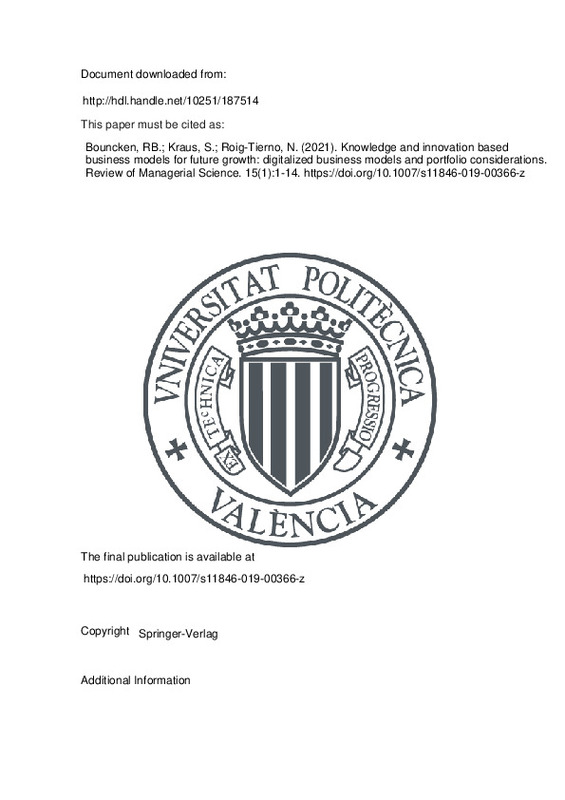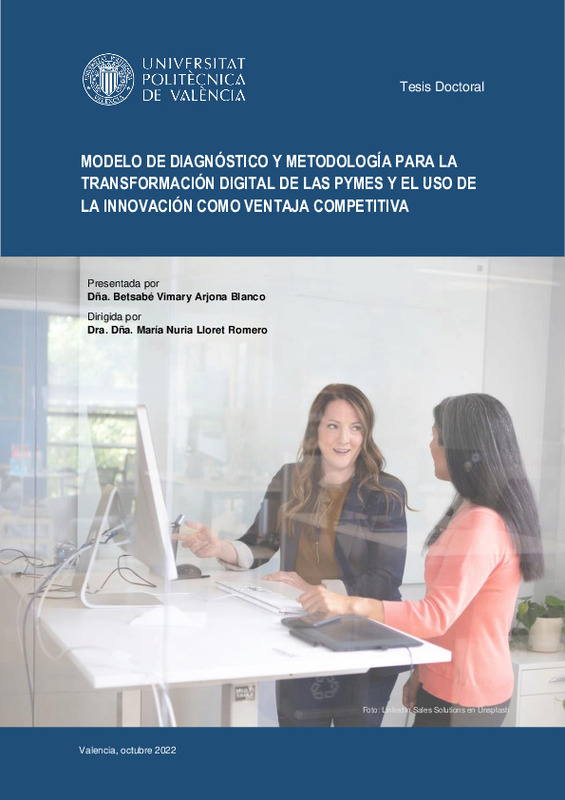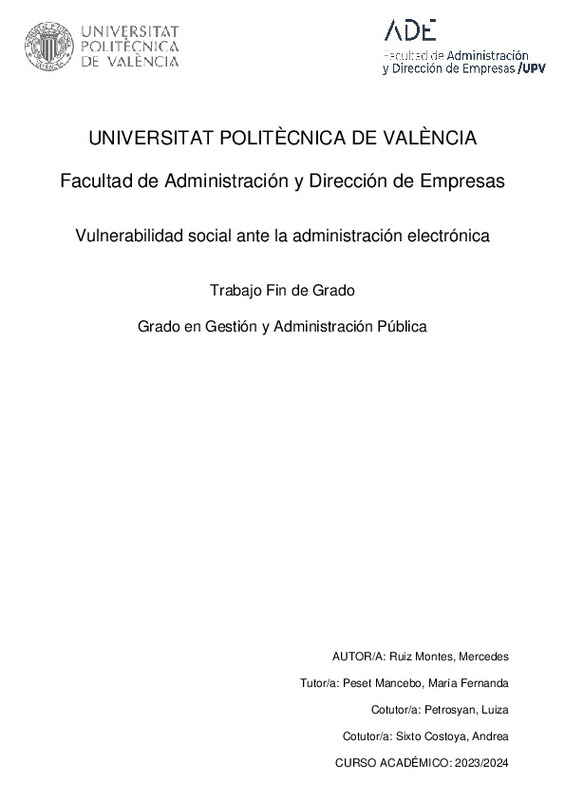JavaScript is disabled for your browser. Some features of this site may not work without it.
Buscar en RiuNet
Listar
Mi cuenta
Estadísticas
Ayuda RiuNet
Admin. UPV
Knowledge and innovation based business models for future growth: digitalized business models and portfolio considerations
Mostrar el registro sencillo del ítem
Ficheros en el ítem
| dc.contributor.author | Bouncken, Ricarda B.
|
es_ES |
| dc.contributor.author | Kraus, Sascha
|
es_ES |
| dc.contributor.author | Roig-Tierno, Norat
|
es_ES |
| dc.date.accessioned | 2022-10-11T18:04:47Z | |
| dc.date.available | 2022-10-11T18:04:47Z | |
| dc.date.issued | 2021-01 | es_ES |
| dc.identifier.issn | 1863-6683 | es_ES |
| dc.identifier.uri | http://hdl.handle.net/10251/187514 | |
| dc.description.abstract | [EN] Today¿s key challenge for firm growth relies in the integration of digital technologies and their use in new business models. Thus, firms increasingly engage in a digital transformation and in digitalizing their business model. Firms can apply digital technologies for improved or novel internal and external processes and integrate them in new business models. The digital transformation itself demands diverse knowledge from diverse origins in the firm. We examine the key concepts related to business model digitalization. We develop a conceptual matrix for portfolio considerations of firm business model digitalization. We introduce the seven contributions in this special issue on knowledge and innovation related to business and offer some recommendations for future research on the new working conditions and digital identities of firms. | es_ES |
| dc.language | Inglés | es_ES |
| dc.publisher | Springer-Verlag | es_ES |
| dc.relation.ispartof | Review of Managerial Science | es_ES |
| dc.rights | Reserva de todos los derechos | es_ES |
| dc.subject | Digitalization | es_ES |
| dc.subject | Digital transformation | es_ES |
| dc.subject | Digital business models | es_ES |
| dc.subject | Digital innovation | es_ES |
| dc.subject | Digital platform | es_ES |
| dc.subject | Digital orientation | es_ES |
| dc.subject | Digital work | es_ES |
| dc.subject.classification | ECONOMIA APLICADA | es_ES |
| dc.title | Knowledge and innovation based business models for future growth: digitalized business models and portfolio considerations | es_ES |
| dc.type | Artículo | es_ES |
| dc.identifier.doi | 10.1007/s11846-019-00366-z | es_ES |
| dc.rights.accessRights | Abierto | es_ES |
| dc.contributor.affiliation | Universitat Politècnica de València. Departamento de Economía y Ciencias Sociales - Departament d'Economia i Ciències Socials | es_ES |
| dc.description.bibliographicCitation | Bouncken, RB.; Kraus, S.; Roig-Tierno, N. (2021). Knowledge and innovation based business models for future growth: digitalized business models and portfolio considerations. Review of Managerial Science. 15(1):1-14. https://doi.org/10.1007/s11846-019-00366-z | es_ES |
| dc.description.accrualMethod | S | es_ES |
| dc.relation.publisherversion | https://doi.org/10.1007/s11846-019-00366-z | es_ES |
| dc.description.upvformatpinicio | 1 | es_ES |
| dc.description.upvformatpfin | 14 | es_ES |
| dc.type.version | info:eu-repo/semantics/publishedVersion | es_ES |
| dc.description.volume | 15 | es_ES |
| dc.description.issue | 1 | es_ES |
| dc.relation.pasarela | S\433988 | es_ES |
| dc.description.references | Achtenhagen L, Melin L, Naldi L (2013) Dynamics of business models—strategizing, critical capabilities and activities for sustained value creation. Long Range Plan 46:427–442. https://doi.org/10.1016/j.lrp.2013.04.002 | es_ES |
| dc.description.references | Amit R, Zott C (2001) Value creation in e-business. Strateg Manag J 22:493–520 | es_ES |
| dc.description.references | Amit R, Zott C (2015) Crafting business architecture: the antecedents of business model design. Strateg Entrep J 4:331–350 | es_ES |
| dc.description.references | Andries P, Debackere K, van Looy B (2013) simultaneous experimentation as a learning strategy: business model development under uncertainty. Strateg Entrep J 7:288–310. https://doi.org/10.1002/sej.1170 | es_ES |
| dc.description.references | Baden-Fuller C, Haefliger S (2013) Business models and technological innovation. Long Range Plan 46:419–426. https://doi.org/10.1016/j.lrp.2013.08.023 | es_ES |
| dc.description.references | Baden-Fuller C, Mangematin V (2013) Business models: a challenging agenda. Strateg Organ 11:418–427 | es_ES |
| dc.description.references | Berends H, Smits A, Reymen I, Podoynitsyna K (2016) Learning while (re) configuring: business model innovation processes in established firms. Strateg Organ. https://doi.org/10.1177/1476127016632758 | es_ES |
| dc.description.references | Bouncken RB, Aslam MM (2019) Understanding knowledge exchange processes among diverse users of Coworking-spaces. J Knowl Manag. https://doi.org/10.1108/JKM-05-2018-0316 | es_ES |
| dc.description.references | Bouncken R, Barwinski R (2020) Shared Digital Identity and Rich Knowledge Ties in Global 3D Printing – A Drizzle in the Clouds? Glob Strategy J (forthcoming) | es_ES |
| dc.description.references | Bouncken RB, Fredrich V (2016) Business model innovation in alliances: successful configurations. J Bus Res 69:3584–3590. https://doi.org/10.1016/j.jbusres.2016.01.004 | es_ES |
| dc.description.references | Bouncken RB, Reuschl AJ (2018) Coworking-spaces: how a phenomenon of the sharing economy builds a novel trend for the workplace and for entrepreneurship. Rev Manag Sci 12:317–334. https://doi.org/10.1007/s11846-016-0215-y | es_ES |
| dc.description.references | Bouncken RB, Komorek M, Kraus S (2014) Crowdfunding: the current state of research. Int Bus Econ Res J 14:407–414 | es_ES |
| dc.description.references | Bouncken RB, Fredrich V, Ritala P, Kraus S (2018a) Coopetition in new product development alliances: advantages and tensions for incremental and radical innovation. Br J Manag 29:391–410. https://doi.org/10.1111/1467-8551.12213 | es_ES |
| dc.description.references | Bouncken RB, Laudien SM, Fredrich V, Görmar L (2018b) Coopetition in coworking-spaces: value creation and appropriation tensions in an entrepreneurial space. Rev Manag Sci 12:385–410. https://doi.org/10.1007/s11846-017-0267-7 | es_ES |
| dc.description.references | Bouncken RB, Fredrich V, Kraus S (2019a) Configurations of firm-level value capture in coopetition. Long Range Plan. https://doi.org/10.1016/j.lrp.2019.02.002 | es_ES |
| dc.description.references | Bouncken RB, Klement S, Pesch R (2019b) Additive manufacturing alliances—Dienstleistungskooperationen in der 3D-Druck Branche. Springer, Wiesbaden | es_ES |
| dc.description.references | Brand M, Tiberius V, Bican PM, Brem A (2019) Agility as an innovation driver: towards an agile front end of innovation framework. Rev Manag Sci | es_ES |
| dc.description.references | Casadesus-Masanell R, Ricart JE (2010) From strategy to business models and onto tactics. Long Range Plan 43:195–215. https://doi.org/10.1016/j.lrp.2010.01.004 | es_ES |
| dc.description.references | Casadesus-Masanell R, Zhu F (2013) Business model innovation and competitive imitation: the case of sponsor-based business models. Strateg Manag J 34:464–482. https://doi.org/10.1002/smj.2022 | es_ES |
| dc.description.references | Castellani P, Rossato C, Giaretta E, Davide R (2019) Tacit knowledge sharing in knowledge-intensive firms: the perception of team members and team leaders. Rev Manag Sci | es_ES |
| dc.description.references | Cennamo C (2019) Competing in digital markets: a platform-based perspective. Acad Manag Perspect. https://doi.org/10.5465/amp.2016.0048 | es_ES |
| dc.description.references | Cho TS, Hambrick DC (2006) Attention as the mediator between top management team characteristics and strategic change: the case of airline deregulation. Organ Sci 17:453–469. https://doi.org/10.1287/orsc.1060.0192 | es_ES |
| dc.description.references | Clauss T, Harengel P, Hock M (2018a) The perception of value of platform-based business models in the sharing economy: determining the drivers of user loyalty. Rev Manag Sci. https://doi.org/10.1007/s11846-018-0313-0 | es_ES |
| dc.description.references | Clauss T, Kesting T, Naskrent J (2018b) A rolling stone gathers no moss: the effect of customers’ perceived business model innovativeness on customer value co-creation behavior and customer satisfaction in the service sector. R&D Manag. https://doi.org/10.1111/radm.12318 | es_ES |
| dc.description.references | Clauss T, Abebe M, Tangpong C, Hock M (2019a) Strategic agility, business model innovation, and firm performance: an empirical investigation. IEEE Trans Eng Manag. https://doi.org/10.1109/tem.2019.2910381 | es_ES |
| dc.description.references | Clauss T, Bouncken RB, Laudien S, Kraus S (2019b) Business model reconfiguration and innovation in SMEs: a mixed-method analysis from the electronics industry. Int J Innov Manag. https://doi.org/10.1142/s1363919620500152 | es_ES |
| dc.description.references | Colbert A, Yee N, George G (2016) The digital workforce and the workplace of the future. Acad Manag J 59:731–739. https://doi.org/10.5465/amj.2016.4003 | es_ES |
| dc.description.references | Demil B, Lecocq X, Ricart JE, Zott C (2015) Introduction to the SEJ special issue on business models: business models within the domain of strategic entrepreneurship. Strategic Entrep J 9:1–11. https://doi.org/10.1002/sej.1194 | es_ES |
| dc.description.references | Devece C, Palacios-Marqués D, Ribeiro-Soriano DE (2019) IT-based strategy, capabilities, and practices: crowdsourcing implementation in market-oriented firms. Rev Manag Sci | es_ES |
| dc.description.references | Foss NJ, Saebi T (2017) Fifteen years of research on business model innovation: how far have we come, and where should we go? J Manag 43:200–227 | es_ES |
| dc.description.references | Frankenberger K, Weiblen T, Csik M, Gassmann O (2013) The 4I-framework of business model innovation: a structured view on process phases and challenges. Int J Prod Dev 18:249–273 | es_ES |
| dc.description.references | Fredrich V, Bouncken RB, Kraus S (2019) The race is on: configurations of absorptive capacity, interdependence and slack resources for interorganizational learning in coopetition alliances. J Bus Res 101:862–868. https://doi.org/10.1016/j.jbusres.2018.11.038 | es_ES |
| dc.description.references | Garcia De Lomana G, Strese S, Brinckmann J (2019) Adjusting to the digital age: the effects of TMT characteristics on the digital orientation of firms. Acad Manag Proc 2019:13589. https://doi.org/10.5465/AMBPP.2019.13589abstract | es_ES |
| dc.description.references | Ghezzi A, Cavallo A (2018) Agile business model innovation in digital entrepreneurship: lean startup approaches. J Bus Res. https://doi.org/10.1016/j.jbusres.2018.06.013 | es_ES |
| dc.description.references | Grewal D, Puccinelli N, Monroe KB (2018) Meta-analysis: integrating accumulated knowledge. J Acad Mark Sci 46:9–30. https://doi.org/10.1007/s11747-017-0570-5 | es_ES |
| dc.description.references | Grigoriou K, Rothaermel FT (2017) Organizing for knowledge generation: internal knowledge networks and the contingent effect of external knowledge sourcing. Strateg Manag J 38:395–414. https://doi.org/10.1002/smj.2489 | es_ES |
| dc.description.references | Haas MR, Criscuolo P, George G (2015) Which problems to solve? Online knowledge sharing and attention allocation in organizations. Acad Manag J 58:680–711. https://doi.org/10.5465/amj.2013.0263 | es_ES |
| dc.description.references | Hamari J, Sjöklint M, Ukkonen A (2016) The sharing economy: why people participate in collaborative consumption. JASIST 67:2047–2059. https://doi.org/10.1002/asi.23552 | es_ES |
| dc.description.references | Hora W, Gast J, Kailer N, Rey-Marti A, Mas-Tur A (2018) David and Goliath: causes and effects of coopetition between start-ups and corporates. Rev Manag Sci 2:411–439 | es_ES |
| dc.description.references | Hughes M, Rigtering JPC, Covin JG, Bouncken RB, Kraus S (2018) Innovative behaviour, trust and perceived workplace performance. Br J Manag 29:750–768. https://doi.org/10.1111/1467-8551.12305 | es_ES |
| dc.description.references | Humberd BK, Rouse ED (2016) Seeing you in me and me in you: personal identification in the phases of mentoring relationships. Acad Manag Rev 41:435–455. https://doi.org/10.5465/amr.2013.0203 | es_ES |
| dc.description.references | Kohli R, Melville NP (2019) Digital innovation: a review and synthesis. Inf Syst J 29:200–223. https://doi.org/10.1111/isj.12193 | es_ES |
| dc.description.references | Kraus S, Bouncken RB, Eggers F, Schüßler F, Meier F (2016) Standardisation vs. adaption: a conjoint experiment on the influence of psychic, cultural and geographical distance on international marketing mix decisions. Eur J Int Manag 10:127–156 | es_ES |
| dc.description.references | Kraus S, Palmer C, Kailer N, Kallinger FL, Spitzer J (2019a) Digital entrepreneurship: a research agenda on new business models for the twenty-first century. Int J Entrep Behav Res 25:353–375. https://doi.org/10.1108/IJEBR-06-2018-0425 | es_ES |
| dc.description.references | Kraus S, RoigTierno N, Bouncken RB (2019b) Digital innovation and venturing: an introduction into the digitalization of entrepreneurship. Rev Manag Sci 13:519–528. https://doi.org/10.1007/s11846-019-00333-8 | es_ES |
| dc.description.references | Laamanen T, Pfeffer J, Rong K, Van de Ven A (2018) Editors’ Introduction: business models, ecosystems, and society in the sharing economy. Acad Manag Discov 4:213–219. https://doi.org/10.5465/amd.2018.0110 | es_ES |
| dc.description.references | Lanzolla G, Lorenz A, Miron-Spektor E, Schilling M, Solinas G, Tucci C (2018) Digital transformation: what is new if anything? Acad Manag Discov 4:378–387. https://doi.org/10.5465/amd.2018.0103 | es_ES |
| dc.description.references | Markides CC (2013) Business model innovation: what can the ambidexterity literature teach us? Acad Manag Perspect 27:313–323 | es_ES |
| dc.description.references | Martins LL, Rindova VP, Greenbaum BE (2015) Unlocking the hidden value of concepts: a cognitive approach to business model innovation. Strateg Entrep J 9:99–117. https://doi.org/10.1002/sej.1191 | es_ES |
| dc.description.references | Massa L, Tucci CL, Afuah A (2017) A critical assessment of business model research. Acad Manag Ann 11:73–104. https://doi.org/10.5465/annals.2014.0072 | es_ES |
| dc.description.references | McGrath RG (2010) Business models: a discovery driven approach. Long Range Plan 43(2–3):247–261 | es_ES |
| dc.description.references | Medina-Molina C, Rey-Moreno M, Felício JA, Romano Paguillo I (2019) Participation in crowdfunding among users of collaborative platforms: the role of innovativeness and social capital. Rev Manag Sci. https://doi.org/10.1007/s11846-019-00329-4 | es_ES |
| dc.description.references | Miranda S, Cunha P, Duarte M (2019) An integrated model of factors affecting consumer attitudes and intentions towards youtuber-generated product content. Rev Manag Sci—Draft | es_ES |
| dc.description.references | Morkunas VJ, Paschen J, Boon E (2019) How blockchain technologies impact your business model. Bus Horiz 62:295–306. https://doi.org/10.1016/j.bushor.2019.01.009 | es_ES |
| dc.description.references | Morris M, Schindehutte M, Allen J (2005) The entrepreneur’s business model: toward a unified perspective. J Bus Res 58:726–735. https://doi.org/10.1016/j.jbusres.2003.11.001 | es_ES |
| dc.description.references | Muhic M, Bengtsson L (2019) Dynamic capabilities triggered by cloud sourcing—a stage-based model of business model innovation business model innovation. Rev Manag Sci | es_ES |
| dc.description.references | Muñoz-Pascual L, Curado C, Galende J (2019) How does the use of information technologies affect the adoption of environmental practices in SMEs? A mixed-methods approach. Rev Manag Sci | es_ES |
| dc.description.references | Nambisan S, Lyytinen K, Majchrzak A, Song M (2017) Digital innovation management: reinventing innovation management research in a digital world. MIS Q 41:223–238 | es_ES |
| dc.description.references | Ocasio W, Laamanen T, Vaara E (2018) Communication and attention dynamics: an attention-based view of strategic change. Strateg Manag J 39:155–167 | es_ES |
| dc.description.references | O’Leary DE (2013) Artificial intelligence and big data. IEEE Intell Syst 28:96–99 | es_ES |
| dc.description.references | Osiyevskyy O, Dewald J (2015) Explorative versus exploitative business model change: the cognitive antecedents of firm-level responses to disruptive innovation. Strateg Entrep J 9:58–78. https://doi.org/10.1002/sej.1192 | es_ES |
| dc.description.references | Pesch R, Bouncken RB (2018) How to achieve benefits from diversity in international alliances: mechanisms and cultural intelligence. Glob Strategy J 8:275–300 | es_ES |
| dc.description.references | Pierscieniak A, Krawczyk-Sokolowska I (2019) The innovation potential of the enterprise in the context of the economy and the business model. Rev Manag Sci | es_ES |
| dc.description.references | Pinazo-Dallenbach P, Mas-Tur A, Lloria B (2016) Using high-potential firms as the key to achieving territorial development. J Bus Res 4:1412–1417 | es_ES |
| dc.description.references | Probst L, Röglinger M, Faisst U (2018) Structuring digital transformation: a framework of action fields and its application at ZEISS. J Inf Technol Theory Appl 19:31–54 | es_ES |
| dc.description.references | Ribeiro-Soriano D, Kraus S (2018) An overview of entrepreneurship, innovation and sensemaking for improving decisions. Group Decis Negot 27:313–320. https://doi.org/10.1007/s10726-018-9569-7 | es_ES |
| dc.description.references | Richter C, Kraus S, Bouncken RB (2015a) Virtual currencies like bitcoin as a paradigm shift in the field of transactions. Int Bus Econ Res J 14:575 | es_ES |
| dc.description.references | Richter C, Kraus S, Syrjä P (2015b) The shareconomy as a precursor for digital entrepreneurship business models. Int J Entrep Small Bus 25:18–35 | es_ES |
| dc.description.references | Richter C, Kraus S, Brem A, Durst S, Giselbrecht C (2017) Digital entrepreneurship: innovative business models for the sharing economy. Creat Innov Manag 26:300–310 | es_ES |
| dc.description.references | Ritala P, Golnam A, Wegmann A (2014) Coopetition-based business models: the case of Amazon.com. Ind Mark Manag 43:236–249. https://doi.org/10.1016/j.indmarman.2013.11.005 | es_ES |
| dc.description.references | Roy R, Sarkar MB (2016) Knowledge, firm boundaries, and innovation: mitigating the incumbent’s curse during radical technological change. Strateg Manag J 37:835–854. https://doi.org/10.1002/smj.2357 | es_ES |
| dc.description.references | Sohl T, Govert Vroom, Fitza M (2018) How much does business model matter for firm performance? A variance decomposition analysis. Acad Manag Discov. https://doi.org/10.5465/amd.2017.0136 | es_ES |
| dc.description.references | Sosna M, Trevinyo-Rodríguez RN, Velamuri SR (2010) Business model innovation through trial-and-error learning: the Naturhouse case. Long Range Plan 43:383–407 | es_ES |
| dc.description.references | Soublière J-F, Joel G (2019) The legitimacy threshold revisited: how prior successes and failures spill over to other endeavors on kickstarter. Acad Manag J 1:1. https://doi.org/10.5465/amj.2017.1103 | es_ES |
| dc.description.references | Suddaby R, Bitektine A, Haack P (2017) Legitimacy. Acad Manag Ann 11:451–478. https://doi.org/10.5465/annals.2015.0101 | es_ES |
| dc.description.references | Sullivan BN (2010) Competition and beyond: problems and attention allocation in the organizational rulemaking process. Organ Sci 21:432–450. https://doi.org/10.1287/orsc.1090.0436 | es_ES |
| dc.description.references | Tallman S, Luo Y, Buckley PJ (2018) Business models in global competition. Glob Strategy J 8:517–535. https://doi.org/10.1002/gsj.1165 | es_ES |
| dc.description.references | Teece DJ (2010) Business models, business strategy and innovation. Long Range Plan 43(2–3):172–194 | es_ES |
| dc.description.references | Teece DJ, Linden G (2017) Business models, value capture, and the digital enterprise. J Organ Des 6:8 | es_ES |
| dc.description.references | Tuggle CS, Schnatterly K, Johnson RA (2010) Attention patterns in the boardroom: how board composition and processes affect discussion of entrepreneurial issues. Acad Manag J 53:550–571 | es_ES |
| dc.description.references | v. Alberti-Alhtaybat L, Al-Htaybat K, Hutaibat K (2019) A knowledge management and sharing business model for dealing with disruption: the case of Aramex. J Bus Res 94:400–407. https://doi.org/10.1016/j.jbusres.2017.11.037 | es_ES |
| dc.description.references | Wang Q, Myers MD, Sundaram D (2013) Digital natives and digital immigrants, Business & Information. Syst Eng 5:409–419. https://doi.org/10.1007/s12599-013-0296-y | es_ES |
| dc.description.references | Yoo Y, Boland RJ Jr, Lyytinen K, Majchrzak A (2012) Organizing for innovation in the digitized world. Organ Sci 23:1398–1408 | es_ES |
| dc.description.references | Yu J, Engleman RM, Van de Ven AH (2005) The integration journey: an attention-based view of the merger and acquisition integration process. Organ Stud 26:1501–1528 | es_ES |
| dc.description.references | Zammuto RR, Griffith T, Majchrzak A, Dougherty D, Faraj S (2007) Information technology and the changing fabric of organization. Organ Sci 18:749–762. https://doi.org/10.1287/orsc.1070.0307 | es_ES |
| dc.description.references | Zott C, Amit R (2010) Business model design: an activity system perspective. Long Range Plan 43:216–226 | es_ES |







![[Cerrado]](/themes/UPV/images/candado.png)




